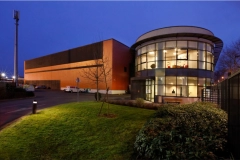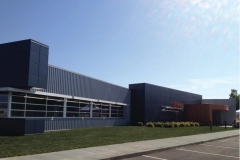Biotech, Education and Pharma Sectors Drive Boston Data Center Market
Biotech, Education and Pharma Sectors Drive Boston Data Center Market
Boston holds a place as one of the more prominent data center markets in the Northeast. This launches our special report series on the Boston Data Center Market.

Get the full report
The Boston data center market supports enterprise customers in higher education, biotechnology, and the pharmaceutical sector. Boston is also a growing hub for startups in various sectors. According to a report by EY, there are 350 fintech startups headquartered in Massachusetts, with the number increasing year on year. The surge of robotic startups in the city, such as Boston Dynamics and iRobot, is also a direct result of the amount of investors in the region.
Known as the “other” tech valley, the 55-plus-mile Boston beltway that is Route 128 earned the name “America’s Technology Highway” preceding the first tech boom in the late 90s because of the high number of technology firms in the area.
As one of the major cities on the I-95 corridor, Boston is a major regional employment center and home to many enterprise companies. The flow of entrepreneurs from Harvard and MIT contributes to Boston’s local innovation economy.
Boston is home to 868,491 square feet (SF) of commissioned data center space representing 86 megawatts (MW) of commissioned power, according to market research from datacenterHawk. In the third quarter of 2021, the vacancy rate for the region was 15.3 percent.
The Boston region is dominated by companies in the healthcare and education verticals, including medical research, biotech manufacturing, health care administration, higher education, and startups in the tech and AI space. These sectors have all witnessed a significant increase in data processing and storage demand since the beginning of the pandemic, and more generally, due to the widespread adoption of electronic medical records.
Many large-scale compute requirements in the Northeast continue to land in Northern Virginia, but some companies still require regional network hubs in close proximity to their offices. This data locality requirement creates an opportunity for established companies or startups in the life sciences vertical to colocate within the Boston area, where demand for office/lab space near major universities in Boston and Cambridge has skyrocketed. Boston is poised to become a regional hub for these edge requirements and the major cloud on-ramps are now provisioned in the area.

Most of the data center customers in the Boston market are local to the region. As with other major Northeast cities, Boston’s market is influenced by the relatively high cost of power, which is a challenge for users with large footprint requirements. As a result, service providers and facilities in Boston have focused on supporting key sectors of the local tech economy, including healthcare, biotech and pharmaceutical companies and software startups.
Data center requirements in Boston come in a variety of sizes, but most are below 500 kW. Companies with needs larger than that size are typically well- established with a need to be in the Boston area.
On the connectivity front, Boston offers some of the shortest fiber distance in the US to major hubs in the UK and Europe, as well as a variety of long- haul network options connecting to major metros in North America.
Within the Boston area, the available levels of data center supply are sufficient to meet the current levels of consumer demands. Some providers are adding new capacity to support future growth, but these expansions are relatively modest in scope and unlikely to be disruptive to pricing or competition.
The Boston Market
Large cities with growing economies create data center demand. With the 9th largest economy in the US by GDP, Boston naturally attracts attention from data center professionals. Along with New Jersey, New York, and Northern Virginia, Boston holds a place as one of the more prominent data center markets on the East Coast, specifically in the Northeast. Boston is an appealing market for several reasons:
- Proximity to Large, Northeastern Cities
The stable climate and geographic proximity to New York and Northern New Jersey enables Boston to function as a disaster-recovery location for data center users with existing infrastructure in these areas. - Diverse Economy
Boston has a relatively diverse economy, with manufacturing, IT, financial, education, business, and healthcare industries represented. The Massachusetts Bay Area is home to 12 Fortune 500 companies, including Liberty Mutual and Staples. - Growing Interest in Edge Markets
Multiple data center operators are expanding their focus to edge markets. As a less developed data center market with a high population, Boston is
an ideal candidate as an edge market. - Innovative Tech Hub
Boston’s tech presence is growing due to the presence of major educational institutions, such as MIT and Harvard. A large portion of the growth is due to Boston’s focus on biotech. To compete with the broad tech focus in Silicon Valley, other markets must excel in one primary area of tech focus. Boston currently leads the world in biotech startup activity, giving the city the ability to compete with other major tech markets.
Major data center operators have a presence in the Boston market, including Digital Realty, CoreSite, Equinix, INAP, Iron Mountain, and TierPoint, along with several others. In major markets, such as Northern Virginia, Dallas, Chicago, and Silicon Valley, providers are purchasing large tracts of land to build out data center campuses over a long period of time. In addition to large campuses, both colocation and cloud providers are constructing their individual facilities on a massive scale.
Boston’s industrial power cost is higher than most major markets, making hyperscale data center projects somewhat expensive. While the hyperscale trends may not work in Boston, data center operators are still able to find success. Legacy buildings in the market are ripe with opportunities to retrofit aging infrastructure, as their operators contend with expiring equipment lifecycles.
Download the full report, Boston Data Center Market, courtesy of Digital Realty, to learn more about this competitive data center market. In our next article, we’ll look at market trends in supply and demand.
More >> Biotech, Education and Pharma Sectors Drive Boston Data Center Market


